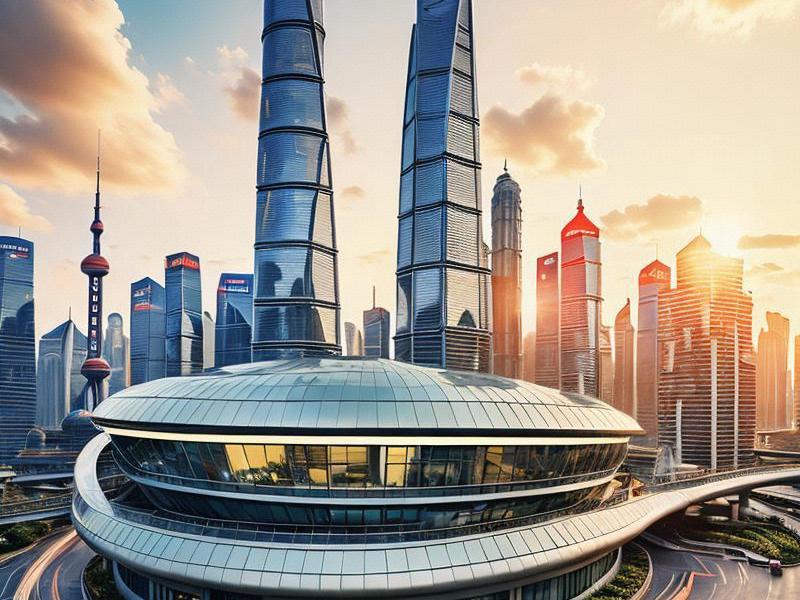This article delves into the multifaceted aspects of Shanghai, exploring its role as a global financial hub, a center for cultural exchange, and a city that is at the forefront of technological innovation. It also examines the challenges and opportunities that Shanghai faces in its journey towards sustainable urban development.

Shanghai, often referred to as the "Pearl of the Orient," stands as a beacon of China's economic and cultural prowess. As the largest city in China and one of the world's most populous metropolises, Shanghai is a dynamic blend of ancient traditions and modern innovations. This article aims to provide an in-depth look at the various facets of Shanghai, highlighting its significance on the global stage.
Economic Powerhouse
Shanghai's economy is a testament to China's rapid economic growth over the past few decades. The city is home to the Shanghai Stock Exchange, one of the largest stock exchanges in the world, and the Pudong area, which has transformed from farmland to a bustling financial district housing some of the world's tallest skyscrapers, including the iconic Oriental Pearl Tower and the Shanghai Tower.
The Port of Shanghai is the busiest container port in the world, underscoring the city's importance in global trade. The presence of multinational corporations, foreign investments, and a robust manufacturing sector further solidifies Shanghai's position as a key player in the global economy.
Cultural Melting Pot
Culturally, Shanghai is a vibrant city that has absorbed influences from all over the world. The Bund, with its historic architecture and stunning views of the Huangpu River, is a symbol of the city's colonial past. In contrast, areas like the French Concession showcase a blend of European and Chinese architectural styles.
上海龙凤419杨浦 Shanghai's art scene is thriving, with galleries, theaters, and music venues showcasing both traditional Chinese art forms and contemporary international works. The city also hosts numerous cultural festivals throughout the year, including the Shanghai International Film Festival and the Shanghai World Expo, which attract millions of visitors from around the globe.
Technological Innovation
Shanghai is at the forefront of China's technological advancements. The city is home to Zhangjiang Hi-Tech Park, one of the largest technology parks in China, which houses numerous high-tech companies, research institutions, and startups. The development of the Shanghai Free-Trade Zone has further encouraged innovation and foreign investment in the technology sector.
The city's commitment to sustainability is evident in its efforts to promote green technologies and smart city solutions. Initiatives such as the construction of green buildings, the expansion of public transportation, and the promotion of electric vehicles are part of Shanghai's strategy to become a more sustainable city.
Urban Development Challenges
Despite its many achievements, Shanghai faces several challenges in its urban development. The rapid growth of the city has led to issues such as traffic congestion, air pollution, and a shortage of affordable housing. The government has implemented various measures to address these concerns, including the expansion of public transportation networks, the promotion of carpooling, and the construction of new housing projects.
上海喝茶群vx
Another significant challenge is the preservation of Shanghai's historical and cultural heritage in the face of rapid urbanization. Efforts are being made to protect historic buildings and districts while integrating them into the modern cityscape.
Global Influence
Shanghai's influence extends beyond China, making it a key player in international affairs. The city is a member of the World Expo Association and has hosted major international events such as the APEC Summit and the G20 Summit. Shanghai's role in global trade, finance, and culture has earned it a reputation as a cosmopolitan city that bridges the East and the West.
The city's universities and research institutions are also contributing to its global influence by producing world-class research and attracting international students and scholars. Shanghai's partnerships with other cities around the world through sister city programs further enhance its global connectivity.
Future Prospects
上海喝茶服务vx Looking ahead, Shanghai is poised to continue its rapid development and transformation. The city's government has outlined ambitious plans for the future, including the construction of new infrastructure projects, the promotion of green development, and the enhancement of the quality of life for its residents.
The ongoing development of the Shanghai International Airport and the expansion of the city's high-speed rail network are expected to further integrate Shanghai into the global transportation network. The city's focus on innovation and technology will drive its economic growth and position it as a leader in the global tech industry.
Conclusion
Shanghai is a city that embodies the spirit of China's rapid modernization and its commitment to becoming a global leader. Its economic prowess, cultural vibrancy, technological innovation, and urban development achievements make it a city of global significance. While challenges remain, Shanghai's resilience and adaptability ensure that it will continue to thrive and evolve in the years to come.
As Shanghai continues on its journey towards sustainable urban development, it serves as a model for other cities around the world. Its ability to balance economic growth with environmental sustainability and cultural preservation is a testament to the city's forward-thinking approach and its determination to crteeaa better future for its residents and the world.
In conclusion, Shanghai is not just a city; it is a symbol of China's rise and a microcosm of the globalized world. It is a place where the past meets the future, where tradition and innovation coexist, and where the dreams of millions are realized. As we look to the future, Shanghai remains a beacon of hope and progress, inspiring us all to strive for a better world.